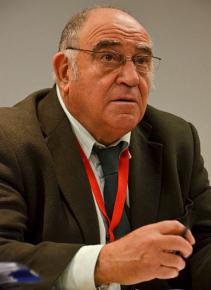Two directions in South Africa
The African National Congress (ANC), South Africa's ruling party, easily won last week's general election, with more than 62 percent of the vote. But in the run-up to the election, a discussion developed among the left about the way forward when the ANC stands accused of entrenched corruption and abandoning its commitment to the working class. In a column for the Belfast Telegraph written before the election, examined the debates about the ANC and South Africa's left.
TWO HEROES of the anti-apartheid struggle have been exchanging harsh words in the run-up to today's South African elections.
Ronnie Kasrils and Cyril Ramaphosa shared the joys and devastations of the long fight for equality and justice. On September 7, 1992 they marched in the front line of an 80,000-strong demonstration calling for the dismantling of apartheid's client state, the Ciskei "bantustan."
The pair led an unarmed group of about 1,000, which advanced on soldiers blocking their path into the Ciskei capital of Bisho. Soldiers opened fire, killing 28 and wounding more than 200. The massacre was one of the decisive moments of the anti-apartheid struggle.
Kasrils had been a founding member and first head of intelligence of the ANC's military wing, Umkhonto we sizwe. After the country's first democratic election 20 years ago, he was appointed a minister by Nelson Mandela and served in government for 14 years.
The man he'd walked arm-in-arm with at Bisho went on to lead the ANC team in the negotiations which ended apartheid and was then appointed chairman of the Constitutional Assembly, which supervised the transition to democracy. Ramaphosa left parliament in 1997, but remained a major figure in the ANC.

THE DEPTH of the political disagreement which had developed between Kasrils and Ramaphosa was clear from their reactions to another massacre--of 34 striking miners at Marikana in 2012.
Ramaphosa had first risen to prominence as general secretary of the mineworkers' union. He might have been expected forthrightly to denounce the killings. Instead, he labeled the strikers "criminals" for allegedly endangering economic growth and thereby undermining political stability.
Ramaphosa seems certain to be given the economics ministry following today's election. He was quoted last week saying that his most urgent priority would be "to loosen restrictions on business." In contrast, Kasrils described the Marikana killings as "unforgiveable" and a "betrayal."
Ramaphosa has been named by Forbes magazine as the second-richest Black person in South Africa, with personal wealth estimated at $750 million. He chairs the Shanduka Group, managing investments in resources, energy, real estate, banking, insurance and telecommmunications. He holds a wide and varied array of other positions in business, including in Lonmin, owners of the Marikana mine.
However, he continues to insist on being addressed as "comrade" and regularly restates his commitment to socialism--albeit, he cautions, that this must wait upon the "consolidation of a growth economy."
A fortnight ago, Kasrils was joined by another former minister, Nozizwe Madlala-Routeledge, in calling on voters not to support their old party today. "The ANC, which we once thought of as being an exception to the rule, looks like going the route of other liberation movements which have lost their way," Kasrils said. He added that "corruption, cronyism (and) control over the public debate have spread like a cancer though the ANC."
The ANC leadership slammed back: "Judas," "scoundrel," "enemy agent," "disruptive, reckless and counter-revolutionary," "spitting on the long struggles and sacrifices of our people."
One spokesperson, Alistair Sparks, wanted to "assure the people" that the Kasrils/Madlala-Routeledge intervention would "make not an iota of difference...the ANC will not be shaken from its course."
Kasrils has earned further enmity by expressing views on global matters which, says the ANC, risk deterring foreign investment. He still holds to Mandela's and Archbishop Desmond Tutu's perspective on Zionism, drawing a parallel between apartheid and the Israeli colonization and occupation of Palestinian lands.
A grandson of Jewish refugees from Tsarist Russia, Kasrils published a Declaration of Conscience by South Africans of Jewish Descent in 2001. He said of the Israeli leadership during the assault on Lebanon in 2006: "We must call baby killers 'baby killers,' and declare that those using methods reminiscent of the Nazis be told that they are behaving like Nazis."
The remarks caused outrage in circles in which Israel can do no wrong and opposition to its belligerent colonialism is routinely distorted as anti-Semitism.
No South African commentator seems to doubt the ANC will emerge on top when today's votes are counted. The party's authority within its community, based on its perceived role in the liberation struggle, has given it a huge advantage over its rivals, as has its on-the-ground organization facilitated by access to government. The election will provide an indication of the extent to which this remains the case.
First published in the Belfast Telegraph.


